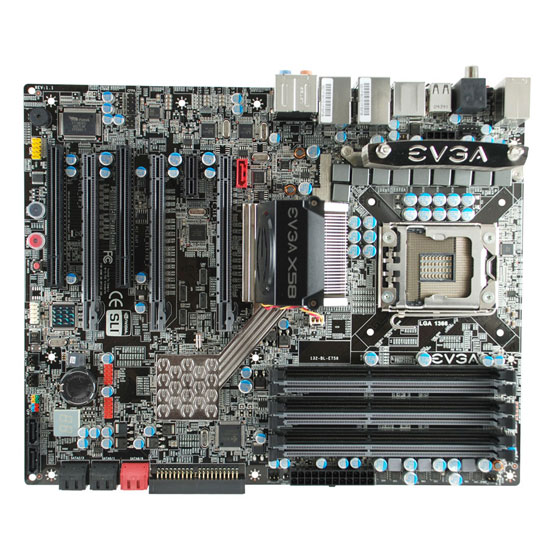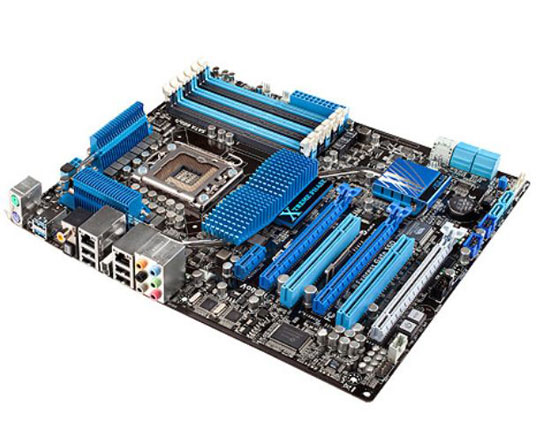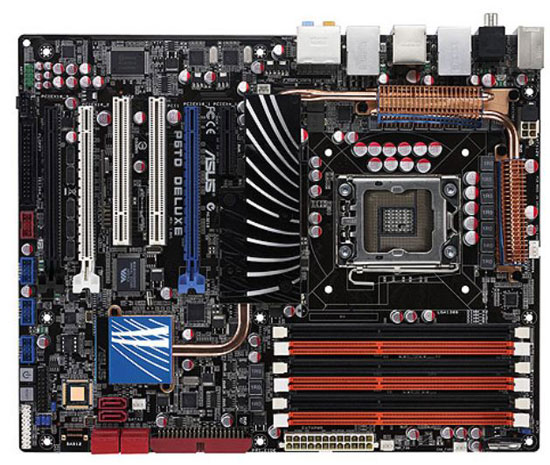Loyd's New Year - A Trio of Problem Systems
by Loyd Case on January 13, 2010 12:00 AM EST- Posted in
- Systems
The Slowly Dying Motherboard
My production system runs a Core i7 965 and 12GB of OCZ DDR3-1600 memory. The 965 clocks at 3.33GHz, and the memory runs at 1333MHz. In either case, it’s not really much of an overclock. The X58 chipset and Core i7 socket 1366 CPUs are rated at DDR3-1066 speeds officially. So technically, the memory is being overclocked.
The system was based on an eVGA X58 SLI motherboard – one of the early versions that shipped. I’d updated the BIOS as new versions came out.

Recently, I’d been having a weird series of glitches. My USB ports would stop working. Once every couple of days, I’d lose network connectivity. My audio would mysteriously stop working, even though I’d see audio activity in any media player, and the speakers seemed to be behaving correctly.
If finally occurred to me that maybe my I/O controller hub was slowly failing, or had developed an intermittent hiccup that created these seemingly unrelated issues.
So I decided to upgrade my motherboard.
My general philosophy when it comes to building the systems I actually use for productive work and personal gaming is to be somewhat conservative – if I can. Go with solutions that seem reliable and robust. I’d waited to upgrade my own system to Core i7 until I’d tested a slew of X58 boards, and the eVGA board had seemed stable. In fact, it had been running problem-free for months.
So naturally I ignored my own inclinations and bought a brand spanking new Asus P6X58D, which sported a discrete NEC USB 3.0 controller and a Marvell SATA 6gbps disc controller.

The board arrived, and seemed to install normally. Windows enumerated all the devices properly, and rebooted as expected. I installed the new drivers from the Asus DVD and rebooted.
Then a new symptom developed: after a warm boot, the fan on the Radeon HD 5870 would spin up to maximum speed and stay there. The sound was almost deafening. When this would occur, the system wouldn’t POST. Only shutting down the power supply and waiting a couple of minutes would allow for a normal boot.
Whiskey. Tango. Foxtrot.
After trying a variety of things – different CPUs, swapping in different memory, upgrading the BIOS (from 0201 to 0402) and even swapping in a different AMD graphics card, nothing changed. So I gave up. I headed out to my local friendly white box shop (Central Computer in San Jose), I picked up another Asus board: a P6TD Deluxe. The P6TD is a second (third?) generation X58 board from Asus, with more copper and 16-phase power. It’s really a souped up P6T board, but refined over the original design.

Swapped back in my original components, fired up the system and held my breath.
The system POSTed normally. Since then, I’ve run a number of applications, including some fairly system intensive games, and it’s all behaving as it should.
Lesson learned: when you need a working system for, well, work, then don’t go with the bleeding edge. I knew that already, but every now and then, I have to re-learn it. I suppose it’s my eternally optimistic nature, but I tend to believe that newer is often better. Alas, it’s not always the case.










109 Comments
View All Comments
nubie - Wednesday, January 13, 2010 - link
I think he is saying to buy Intel motherboards, at least they seem to have solid reliability.RJohnson - Wednesday, January 13, 2010 - link
IMO he's talking about ASUS and i'd pretty much agree with him, my recent experiences with them have been poor to say the least...michal1980 - Wednesday, January 13, 2010 - link
sounds like an ASUS mobo.They almost always review well/good. But I've had issues with each one, from various generations and families.
eastiest non-overclocking boards I've worked with were Gigabyte, and evga. most stable overclocking a dfi.
asus is off my list
yyrkoon - Thursday, January 14, 2010 - link
Yeap Asus, it is. Corsair is another off my list as well. Add DFI, and Asrock while we're at it. But hey, maybe I am just being finicky ? Because I know what I want . . .Anyways, best Over clocking board I had, and still own is/was the ABIT IP35-E, and it does this reliably. Not that I really need it, but who would not want to at least TRY getting more bang for the buck. At least once. right now, it happily chugs right along with the accompanying E6550 at 2.8Ghz. Stock voltages, stock heat sink. Has never crashed due to hardware issues once. Unless you count the time(s) I tried pushing said system passed 3.5 Ghz . . . Hopefully, Gigabyte, or MSI can give me something equally as pleasing in the future. For over clocking ? Not important, I just want something that will continue to run stable, until I decide to turn it off. Is this really asking too much ? I really do not think so.
eviloz - Thursday, January 14, 2010 - link
asus is the brand with best marketing ever, u find them everywhere, filled with goodies and at a afordable prices.indd all reviews say nothing but good for them, but.. for me too, they are always unreliable on the long-run.
i was a big asus fanboy in the very past (p2b times) and slowly realized these motherboards cant stand a 2-year life cycle, simply they become unstable, bios issues, lockups and such.
The entire AI thing was a epic fail. Qfan never worked with 3pin fans, the probe software is a piece of crap... and so on
i want to install a mobo, configure it, and after 4 years, come back and see it working like a charm. I know most Anand's readers (including me) change system almost every year, but this it not the real world scenario, where the systems have to work way longer than that.
so i moved to intel. some stuff is ugly, some features are missing, the mb tools are not the best (still far better than asus thu)... but these motherboards are rock solid. i never missed a boot.
my videocard blew up one mobo, it was replaced in 2 (thats TWO) working days, shipping was not charged. beat this.
ofc nothing is perfect, was pretty disappointed to see my dp35dp has no w7 support, but still this board brand is a winner.
btw i have few gigabyte mbs around and they are good too.
for my scenario (reliabilty always before performance, never overclock) the best choice is intel, followed by gigabyte.
i will never buy asus no more.
yyrkoon - Thursday, January 14, 2010 - link
I had been using ABIT since the early 90's, and was extremely happy with every one I purchased for my own systems. Even one of the AMD Thunderbird boards I bought when the "rash" of bad capacitors where circulating lasted 5 years. And it *did have 12 of these bad caps on it. They finally popped, and I replaced them, but it was never the same since. I even modded the BIOS so the system would except a 2000XP+ CPU. Ran perfect. *This* is the worst experience I ever had with them as a brand.I too have had some good experiences with Intel boards, but now days for me, they're too unpredictable.
Now, I am unsure who will deserve my money in the future for motherboards, but I think we all know who it wont be ; ) I suppose Gugabyte will be in order. I have always respected them as a motherboard OEM. Perhaps even MSI.
damianrobertjones - Wednesday, January 13, 2010 - link
I hope your Daughter isn't runing as admin :)SlyNine - Wednesday, January 13, 2010 - link
I think Anand should highlight Dell's throttling issues on these laptops,I'm talking Core I7 720QM's that run as slow as 300mhz while playing games. Dell saying it's not a gaming notebook so it doesn't matter. It sounds like Dell is plenty content to screw over people as long as its not made public.Please Anand take a look at the problems outlined here http://forum.notebookreview.com/showthread.php?t=4...">http://forum.notebookreview.com/showthread.php?t=4...
I beg of you to make these problems obvious so unsuspecting people don't buy something this flawed, I'm getting one tomorrow, wish I hadn't but I'd be willing to offer it to Anand to get these problems in the open.
nubie - Wednesday, January 13, 2010 - link
They should do an article, including a nice ATi/AMD descrete video and then forcing the entire system to function on ~90w is just disgusting.They are seeing between 50 and 100% improvement in modern games when the throttling is off while using a 130w power supply (I am assuming this is with a fully-charged battery, you wouldn't want to charge at the same time and risk burning up the power input lines.)
(of course one of my early PC's was a DELL, it literally burned up, 486 with a joke of a heatsink. Dell really lives on the edge of thermals in my opinion, I can't recommend them.)
Read the thread here: http://forum.notebookreview.com/showthread.php?t=4...">http://forum.notebookreview.com/showthread.php?t=4...
Pitiful. I can't believe they would release an i7 system with modern discrete graphics and this sort of power limit.
SlyNine - Wednesday, January 13, 2010 - link
All we can do is try to get this as much media attention as possible. Hopefully that will prevent Dell from screwing over people to much.